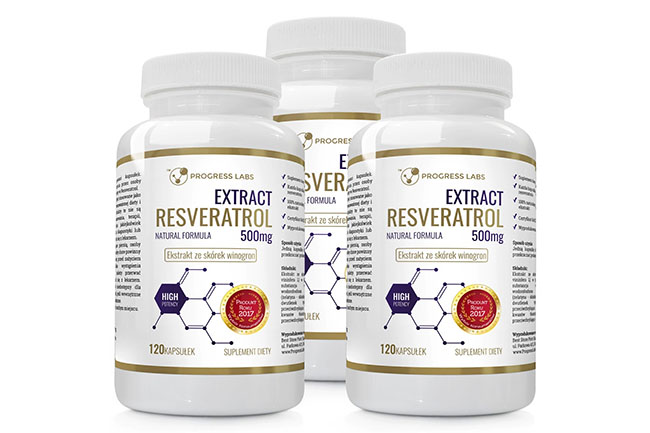The King of Antioxidants, the shield of the brain, the elixir of youth, the nectar of the gods, a molecule of youth, the secret weapon of modern cosmetology – resveratrol received generously plenty of beautiful and pretentious names.
Since its first isolation from poisonous medicinal plants of the hellebore species by Japanese scientist Michiyo Takoka in 1939, constant scientific disputes have not ceased around it. Every year, studies are conducted that either confirm or refute its beneficial properties. It even has its own “godfather”, biologist David Sinclair, who has devoted his life to studying it. So what is this: an eternal youth pill or another empty promise, shouted out with loud marketing slogans?
What is it?

Resveratrol is a natural phytoalexin, a stilbene (aromatic hydrocarbon, diarylethylene), a bioflavonoid and a polyphenol. Some plants produce it as a protective mechanism against pests (bacteria, fungi) and ultraviolet radiation.
Scientific name: trans-3,5,4′-trihydroxystilbene. In some sources, an alternative spelling of the term is found: resveratrol. It has its own designation in the INCI classification (international nomenclature of cosmetic ingredients): Resveratrol.
Industrial production is carried out from plant extracts and wine using fermentation.
Physicochemical properties:
- in pure form it is a powder;
- color: all shades of brown, mainly cocoa;
- characteristic smell: strong and tart, with a musty shade;
- poorly soluble in ethanol and water.
Exists in two forms in nature:
- cis-resveratrol (Z): has a pronounced antioxidant effect, can affect genetic transcription.
- trans-resveratrol (E): has higher biological activity, exhibits a pronounced anti-inflammatory effect, affects cancer cells.
Most studies are conducted using trans-resveratrol. It is this form that is included in most dietary supplements.
It is an organic compound with a complex chemical formula. Therefore, it almost never breaks down into its constituent parts. To increase its effectiveness, manufacturers of dietary supplements add various plant extracts, vitamins, and other bioactive ingredients to them.
Chemical formula: C14H12O3.
Structural formula:

Produced as a dietary supplement with antioxidant, cardioprotective, antidiabetic, and anti-aging properties. Some sports nutrition brands also produce it as a fat burner, helping to increase the effectiveness of training and gain muscle mass. The main form of release is capsules and tablets.
Research
Since the mid-1990s, it has been the subject of constant research. This is due to the works of David Andrew Sinclair, a famous Australian biologist, professor of genetics, and current professor at Harvard University. In 1995, he received his doctorate in molecular genetics and focused his research on the “elixir of longevity” (as the scientist calls this phytoalexin in most of his works and interviews).
The primary focus of the research was the antitumor properties of resveratrol, since an effective medicine for cancer has not yet been found. Many scientists (and not only Sinclair) believed that this would be a real breakthrough in this area. Another aspect that is constantly being studied is its ability to slow down the aging process and prolong life.
A brief history of research and its results is as follows.
- 1997
Prevents the formation of cancer cells on the skin of mice specially affected by carcinogens.
- 2002
Reduces the number and size of tumors, prevents the development of gastric and rectal cancer in rats specially affected by carcinogens.
- 2003
Extends the life span of yeast, nematodes, and fruit flies.
- 2006
Additional studies on mice confirmed antitumor properties.
The first human study was conducted. 10 volunteers were selected to participate in the experiment. As a result, the assumption that antitumor properties extend to the human body was refuted. This was explained by low bioavailability.
Studies of fish by Italian scientists showed an increase in general activity and improvement of learning abilities.
Sinclair confirmed the ability to prolong life (the experiment was conducted on mice).
- 2007
Again studies on mice. Prevents the formation of cancer cells on the skin specially affected by ultraviolet radiation. Slows down the growth of Lewis carcinoma. However, it had no effect on melanoma, stomach tumors, and leukemia.
Another group of scientists reviewed the data from the 2003 study and refuted their results. No increase in life expectancy was found.
- 2011
Studies on synthetic cell models created artificially. Increased apoptosis and slowed tumor growth were found.
Once again confirmed the inability to prolong life.
- 2012
A scientific article by Japanese scientists was published stating that on the basis of resveratrol, it is possible to create a harmless drug that suppresses the Wnt signal (which triggers the growth of tumor cells) for the treatment of cancer.
- 2013
Supports normal brain neuron function during aging.
Sinclair’s 2006 mouse experiment was accurately reproduced as part of the National Institute on Aging’s anti-aging agent testing program. The ability to prolong life was not confirmed.
That same year, South Korean scientists published studies on dogs that showed positive effects on life expectancy.
Conclusions
Most of the above studies were conducted under the leadership of David Sinclair. Not all experiments and published scientific articles are listed here. There are a huge number of them. However, they all have two drawbacks. Firstly, they were carried out on yeast, insects, and rodents. Only once did 10 volunteers act as participants, but the conditions of the experiment were insufficient to draw serious and undeniable conclusions. Secondly, the results obtained are too contradictory.
Based on this, resveratrol is only used as a dietary supplement. Its allegedly beneficial properties remain hypothetical and require serious verification and confirmation. Therefore, it is not used in pharmaceuticals and is not part of any medicinal products.
Benefits and risks

Numerous studies have proven the beneficial effects of resveratrol on the functioning of various internal organs and systems. However, its benefits to the body are still somewhere between theory and practical application. There is a lack of large-scale human trials.
Some scientists (led by Sinclair) consider this compound to be a panacea for many diseases. Others are extremely skeptical. A similar division is observed in the reviews. Some are delighted with the effect of dietary supplements based on it, while others consider their purchase to be a waste of money.
Health benefits
What the human body needs resveratrol for:
- blocks tumor growth;
- reduces the risk of osteoporosis, cardiovascular disease, and liver disease;
- improves skin condition by stimulating collagen production;
- slows cellular aging as a powerful antioxidant;
- improves blood microcirculation, prevents blood clots, lowers cholesterol and sugar, and strengthens blood vessel walls;
- has anti-allergic, immunomodulatory, antibacterial, anti-inflammatory, and vasodilatory effects;
- binds and removes free radicals from the body;
- improves vision;
- activates sirtuin-1, the longevity gene that plays an important role in cellular metabolism, energy production, and protection against age-related changes;
- protects the brain from damage;
- helps the circulatory system
Click to rate this post![Total: 0 Average: 0]



